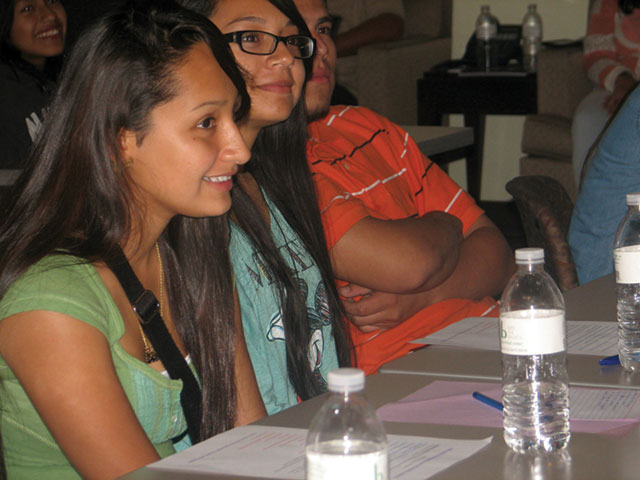It is unfortunately not uncommon these days too hear how bullying and or an ill-mannered child can intimidate another student in school. Good manners can make a big difference in a student’s success and/or failure in many aspects of life. This is why it is so imperative for parents to begin teaching etiquette to their children as early as possible. Oftentimes, as an etiquette expert, I am asked to suggest key ways to instill good manners into children, especially with such a fast-paced family schedule. What I like to suggest is to participate in activities that infuse kids with interpersonal skills such as respect, kindness and being a role model/leader among their peers. Here are some Back-To-School in-home etiquette tips any parent can do with their child to prepare them for school success.
- Use Key Gold and True Words – Please, thank you, excuse me and you’re welcome. Although we know to use these words it can be very easy to fall out of practice. It is good for parents to start working with their children to emphasize the use of these words. Once a child, or teen, understands this etiquette structure he or she will begin to automatically use the words in the appropriate manner. This will be a positive stand-out for the child in school, and very much appreciated by teachers.
- Neat and Tidy – Before school starts is a great time to begin helping children understand how to clean up on their own. Whether coming in the house from the pool, beach or just outside with friends, we need to train children and teens to pick-up after themselves. This skill set may not seem like a big deal until you have a classroom full of students. Again, if your child is accustomed to cleaning up after themselves this will definitely set them apart as a leader and role model. Big plus for them! A great time to practice this rule is at the dinner table as well as practicing washing hands before and after meals.
- Respect others and their differences – This skill set is huge. I cannot emphasize this enough. Most schools have now implemented a no-tolerance code for any child who cannot respect others. Monitor the way your child speaks and/or comments about others, even their friends. What may seem to be a harmless comment or action to a child can be detrimental to another. Practice speaking positive words or giving positive compliments to their siblings and friends. In today’s “give me what I want society” some kids may feel this skill is insignificant; however, understanding the feelings of others and making others feel good is a leadership skill that teachers look upon with high regard.










 Deering Estate
Deering Estate
 Massage Envy South Miami
Massage Envy South Miami
 Calla Blow Dry
Calla Blow Dry
 My Derma Clinic
My Derma Clinic
 Sushi Maki
Sushi Maki
 Sports Grill
Sports Grill
 The Healthy Kitchen
The Healthy Kitchen
 Golden Rule Seafood
Golden Rule Seafood
 Malanga Cuban Café
Malanga Cuban Café

 Kathleen Ballard
Kathleen Ballard
 Panter, Panter & Sampedro
Panter, Panter & Sampedro
 Vintage Liquors
Vintage Liquors
 The Dog from Ipanema
The Dog from Ipanema
 Rubinstein Family Chiropractic
Rubinstein Family Chiropractic
 Your Pet’s Best
Your Pet’s Best
 Indigo Republic
Indigo Republic




 ATR Luxury Homes
ATR Luxury Homes


 2112 Design Studio
2112 Design Studio
 Hamilton Fox & Company
Hamilton Fox & Company
 Creative Design Services
Creative Design Services
 Best Pest Professionals
Best Pest Professionals
 HD Tree Services
HD Tree Services
 Trinity Air Conditioning Company
Trinity Air Conditioning Company
 Cisca Construction & Development
Cisca Construction & Development
 Mosquito Joe
Mosquito Joe
 Cutler Bay Solar Solutions
Cutler Bay Solar Solutions


 Miami Royal Ballet & Dance
Miami Royal Ballet & Dance
 Christopher Columbus
Christopher Columbus
 Pineview Preschools
Pineview Preschools
 Westminster
Westminster
 Carrollton
Carrollton
 Lil’ Jungle
Lil’ Jungle
 Frost Science Museum
Frost Science Museum
 Palmer Trinity School
Palmer Trinity School
 South Florida Music
South Florida Music
 Pinecrest Orthodontics
Pinecrest Orthodontics
 Dr. Bob Pediatric Dentist
Dr. Bob Pediatric Dentist
 d.pediatrics
d.pediatrics
 South Miami Women’s Health
South Miami Women’s Health

 The Spot Barbershop
The Spot Barbershop
 My Derma Clinic
My Derma Clinic




 Miami Dance Project
Miami Dance Project

 Rubinstein Family Chiropractic
Rubinstein Family Chiropractic
 Indigo Republic
Indigo Republic

 Safes Universe
Safes Universe
 Vintage Liquors
Vintage Liquors
 Evenings Delight
Evenings Delight





 Atchana’s Homegrown Thai
Atchana’s Homegrown Thai
 Baptist Health South Florida
Baptist Health South Florida

 Laser Eye Center of Miami
Laser Eye Center of Miami
 Visiting Angels
Visiting Angels
 OpusCare of South Florida
OpusCare of South Florida

 Your Pet’s Best
Your Pet’s Best





 HD Tree Services
HD Tree Services
 Hamilton Fox & Company
Hamilton Fox & Company


 Creative Design Services
Creative Design Services